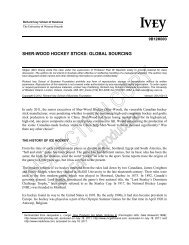foundation of canada asia pacific - Content Tagged with
foundation of canada asia pacific - Content Tagged with
foundation of canada asia pacific - Content Tagged with
Create successful ePaper yourself
Turn your PDF publications into a flip-book with our unique Google optimized e-Paper software.
The report emphasizes the need to “transform international cooperation from its<br />
traditional place as ‘external affairs’ into policy-making applicable to most, if not all,<br />
domestic issue areas.” 5<br />
As noted, many Canadian government departments are already engaged in international<br />
cooperation activities through APEC, CIDA or other organizations, so the transformation<br />
in Canada is already underway. However, this change has come about by accident rather<br />
than by design, <strong>with</strong> little thought given to the coherence <strong>of</strong> these international cooperation<br />
activities <strong>with</strong> overall foreign policy or ODA objectives. In some departments, the<br />
mandate for such activities may not even be clear, <strong>with</strong> no assurance <strong>of</strong> an adequate<br />
budget or policies covering retention <strong>of</strong> revenue. In other cases, the lack <strong>of</strong> a clear mandate<br />
may be holding back departments that could usefully assume some international role.<br />
In the absence <strong>of</strong> clarity about the purpose and limits <strong>of</strong> a department’s role in international<br />
cooperation, it is only a matter <strong>of</strong> time before problems arise, for example working at crosspurposes<br />
<strong>with</strong> other departments or an inability to follow through on promises.<br />
63<br />
Canada’s overall international engagement cannot be compartmentalized among<br />
departments. For example, attempts to restructure the international financial system<br />
will impact upon poverty reduction efforts. The challenge is to mould partnerships<br />
between CIDA and other departments and agencies <strong>with</strong>in a strategic framework. CIDA<br />
can show leadership in this effort. The minister responsible for CIDA is the minister for<br />
international cooperation, which implies a broader range <strong>of</strong> responsibilities than traditional<br />
ODA. Departments have their sectoral expertise, but not necessarily the ability to<br />
manage international projects or cross-cultural training. These skills are among CIDA’s<br />
strengths. It is important that other countries see Canada <strong>of</strong>fering a coherent and<br />
consistent strategy in its ODA. With our influence in the world already far from dominant,<br />
we must have a more strategic approach to international cooperation. We are already guilty<br />
<strong>of</strong> sometimes confusing our foreign partners by the multiplicity <strong>of</strong> faces — national,<br />
provincial, regional and even municipal — <strong>with</strong> which we confront them.<br />
The first step must be to develop a strategic framework that recognizes the diversity <strong>of</strong><br />
players and takes into account the public goods approach to assistance. This would<br />
define more clearly the international role <strong>of</strong> departments and help forge networks<br />
between them. There is a need for a “knowledge broker” to better organize Canada’s<br />
expertise, coordinating the supply <strong>of</strong>, and demand for, services <strong>of</strong>fered by departments<br />
and agencies; maintaining a corporate memory by tracking lessons learned from various<br />
collaboration experiences; and keeping key departments and <strong>of</strong>fices (such as Canadian<br />
overseas posts) informed <strong>of</strong> projects affecting their areas <strong>of</strong> responsibility. Interdepartmental<br />
working groups can be established to identify best practices in departments working<br />
overseas, taking into account mandates, budgets and revenue. These best practices could<br />
form the basis for the development <strong>of</strong> public sector-wide policies that are consistent<br />
<strong>with</strong> the needs <strong>of</strong> international cooperation in a globalized world. Research will be needed<br />
into the scope and impact <strong>of</strong> the “new” cooperation to determine how best to organize<br />
these activities. And an audit should soon be undertaken to determine the total level <strong>of</strong><br />
Canada’s international cooperation spending to help put the ODA target into perspective.



